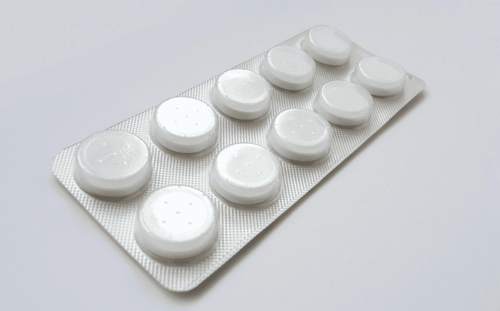This is an automatically translated article.
Spirilix has the main ingredient is Sulpirid 50mg, belongs to the group of psychotropic drugs. The drug is prepared in the form of hard capsules, box of 2 blisters x 15 tablets. Understanding the effects as well as strictly complying with the indications and doses of Spirilix will help patients improve treatment effectiveness and prevent unwanted side effects.
1. Uses of Spirilix
The active ingredient Sulpiride in Spirilix belongs to the Benzamide group, has anti-psychotic effects by selectively blocking dopamine D2 receptors in the brain. Sulpiride is an intermediate between neuroleptics and antidepressants because it has both effects. Sulpiride is used to treat psychotic conditions such as schizophrenia. Sulpiride used in high doses helps to reduce the overwhelmingly positive symptoms of schizophrenia, but low doses have an active and agile effect on people with schizophrenia, lethargic and withdrawn from contact with other people. society.Sulpiride does not affect the patient's emotions like when treated with neuroleptic drugs such as Phenothiazines or Butyrophenon.
2. Indications of the drug Spirilix
Spirilix is indicated in the following cases:
Mental and anxiety disorders in adults, especially after failure of conventional treatments; Acute and chronic schizophrenia.
3. Contraindications of the drug Spirilix
The drug Spirilix is not used in the following cases:
The patient has a history of hypersensitivity to Sulpiride or any of its ingredients; Coma , alcohol intoxication, depressed neurological status due to disease or drug; Have pituitary, breast, adrenal, or prolactin-dependent tumors; Acute disorder of porphyrin metabolism.
4. Dosage and usage of Spirilix
Usage: Spirilix is used by mouth for patients 14 years of age and older. Patients should swallow Spirilix 50mg tablets whole, do not chew, break, or crush them as this can reduce the effectiveness of the drug. The drug is administered whenever it suits the patient's schedule.
Treatment of mental and anxiety disorders in adults over 14 years old: 50 - 150 mg/day, maximum use time of 4 weeks, Treatment of acute and chronic schizophrenia: Patients with negative symptoms : The starting dose is 200-400 mg/time, twice a day. The maximum dose can be increased to 800mg/day, twice a day. Patients with positive symptoms: The starting dose is 400mg/time, twice a day. The maximum dose can be increased to 1.2g/day, twice a day. Patients with negative and positive symptoms combined: 400-600 mg/time, twice a day. Other subjects:
Elderly people: Should start with a low dose of 50-100 mg/time, twice a day, then increase the dose if needed. Patients with renal failure: Patients can still take Spirilix as an adult dose. In case of severe renal impairment, dose adjustment is required based on creatinine clearance: Creatinine clearance 30-60 ml/min: 2/3 of the dose used; Clearance 10-30ml/min: 1/2 dose used; Clearance < 10 ml/min: 1/3 of the dose used.
5. How to handle when you forget to take medicine, overdose of Spirilix
Missing dose:
In case of forgetting about 1-2 hours of medication, patients can quickly take a supplement as soon as they remember. If it is time for the next dose, skip the missed dose, take the next dose as scheduled, do not take a double dose after forgetting the dose. Drug overdose:
When using Spirilix overdose, the patient should stop the drug immediately and go to a medical facility for timely treatment. Sulpiride does not have a specific antidote, gastric lavage should be done immediately if the patient has recently taken an overdose. If the patient has been drinking for a long time, activated charcoal should be used, alkaline urine to increase drug elimination. In addition, treatment of overdose symptoms such as confusion, coma, agitation, hypotension, and supportive therapy should be considered.
6. Side effects of the drug Spirilix
When using Spirilix, patients may experience some unwanted side effects such as:
Common: Drowsiness or insomnia, increased blood prolactin, increased milk secretion, menstrual disorders; Uncommon: Nervous excitation, Parkinson's syndrome, extrapyramidal syndrome, QT prolongation; Rare: Arrhythmia, orthostatic hypotension, gynecomastia in men. If the patient experiences the above symptoms while using Spirilix, it is necessary to stop taking the drug and consult a doctor for appropriate management.
7. Interactions of Spirilix
Spirilix may interact if used concurrently with the following drugs and substances:
Levodopa: Due to co-antagonism, the effectiveness of the drug is reduced; Antihypertensives: Increases the antihypertensive effect and increases the risk of orthostatic hypotension; Antidepressants, tranquilizers, sleeping pills, Methadone, barbiturates, clonidine, antihistamines H1 sedative effect: cause increased neuroinhibitory effect; Alcohol: increases the sedative effect, causes lethargy, sluggishness.
8. Notes when using the drug Spirilix
Caution in people driving and operating machinery because of drowsiness; Caution in people with Parkinson's disease, epilepsy, history of convulsions; Use Spirilix during pregnancy only if the benefits outweigh the risks and reduce the dose towards the end of pregnancy; Spirilix should not be used by women who are breastfeeding because the amount excreted in milk may affect the baby; Do not drink alcohol during treatment with Spirilix; Absolutely do not use if the drug is moldy, discolored, watery, past the expiry date. Above is all information about what Spirilix is, its uses and notes when using it. Patients should carefully read the instructions for use, consult a doctor first to be effective when using and avoid side effects.
Please dial HOTLINE for more information or register for an appointment HERE. Download MyVinmec app to make appointments faster and to manage your bookings easily.













